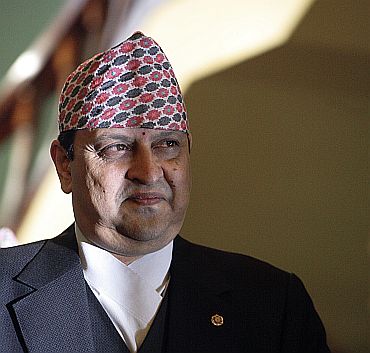 Breaking his silence for the first time after he was deposed two years ago, Nepal's former king Gyanendra has suggested that he was "betrayed" by the political parties, but did not rule out some role for himself in the future.
Breaking his silence for the first time after he was deposed two years ago, Nepal's former king Gyanendra has suggested that he was "betrayed" by the political parties, but did not rule out some role for himself in the future.
62-year-old Gyanendra also said he felt sad over the abolition of the monarchy but did not feel guilty. Supporters of Nepal's former monarch, who is revered as the reincarnation of the Lord Vishnu, have demanded a national referendum to decide if the 240-year-old monarchy should be revived.
Talking to a private television channel, the former monarch also expressed sadness for converting Hindu Nepal into a secular state. In reply to another question, Gyanendra said he might have to play some role in the future but the time has not yet come for that.
Whether I will remain a silent spectator to the current chaotic situation or to play some role it all depends upon the people, he underlined. Mass protests against Gyanendra that began in April 2006 finally culminated in the abolition of the monarchy soon after the Communist Party of Nepal-Maoist emerged as the largest party in the April 2008 Constituent Assembly polls.
Gyanendra vacated the royal palace in June 2008, two weeks after the 601-member Constituent Assembly's abolished the monarchy.
Asked if there was a secret agreement between the political parties and himself to save the monarchy at the end of the 'popular movement' of 2006, he suggested that the parties welshed on their pledge and betrayed him.
"The agreement has already been made public. I dont want to spell it from my mouth at this moment. Many people have understood that. I leave this to the Nepalese people and the people should understand that, he said. He was "sad" that a religion (Hinduism) in which 80 percent people have faith has been sidelined in the country.
Today's political leaders should consider this issue, he underlined. The former monarch said he is now leading a life of a commoner, facing load-shedding like an ordinary people at the Nagarjuna jungle lodge, where he has lived since he left the Narayanhiti Palace in the heart of the capital in June 2008.
I have been paying electricity and drinking water fee like an ordinary people, Gyanendra added.
Replying to another question, Gyanendra said that politicians have the right to speak and they have the duty to listen. Monarchy did not play popular politics, it always tried to maintain national unity, he said.
In his new life as a commoner, his day starts at 6 am with prayers. After that, he spends some time with his grandchildren and also goes for morning walk with his dog.
Gyanendra last week received a "red carpet" welcome by his supporters at a rare public appearance in western Nepalgunj town close to the Indian border for a religious ceremony in the ancient Bageshwori temple. After the religious function, the former monarch met his well-wishers and supporters.
Gyanendra has been at the centre of many conspiracy theories, including the 2001 palace massacre that killed his popular older brother Birendra along with most of the royal family by the then crown prince Dipendra, who was allegedly fuelled by a cocktail of drugs and alcohol.
The deposed king, who has kept a low profile since he left the palace, kicked up a row in March when he hinted the monarchy could still be revived if the people wanted.
"Looking at the pages of history of the country, there have been many ups and downs but it is the people's ultimate decision that everyone needs to obey," Gyanendra said in an earlier interview aired on Avenues Television.
"I don't believe that the monarchy has ended," he said. Political parties have failed to end a deadlock, which is pushing the country towards a constitutional crisis, if the term of the Constituent Assembly is not extended beyond May 28.
At a time of growing political uncertainty, the royal family remains respected among some older Nepalese. Many look upon the monarchy as an institution that provided stability and peace to the country for decades.
Image: Former King of Nepal Gyanendra
Photograph: Reuters





